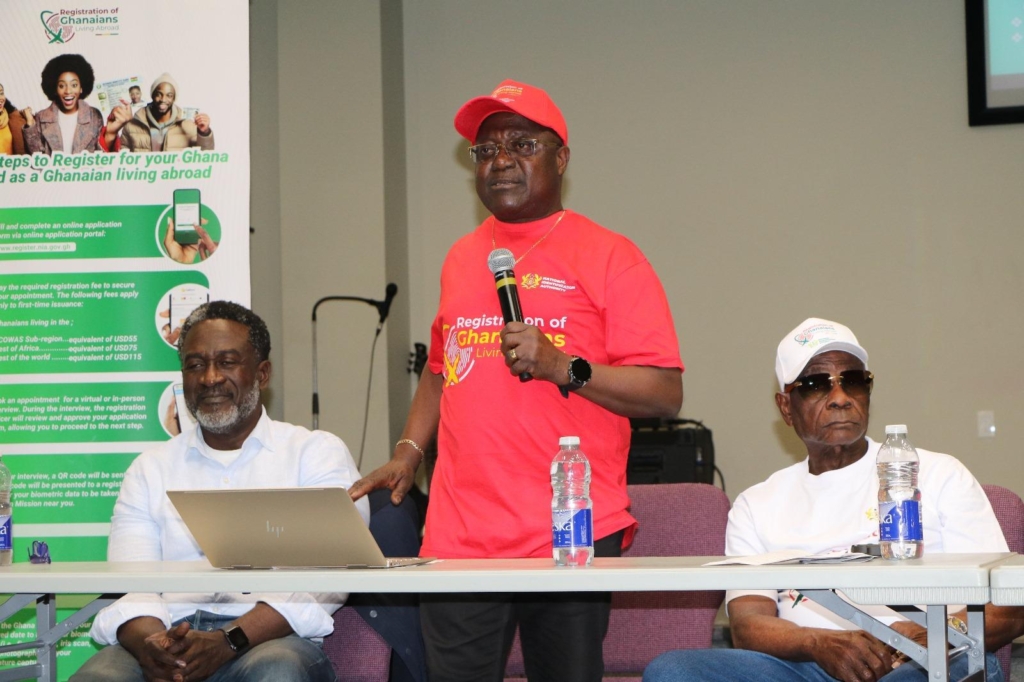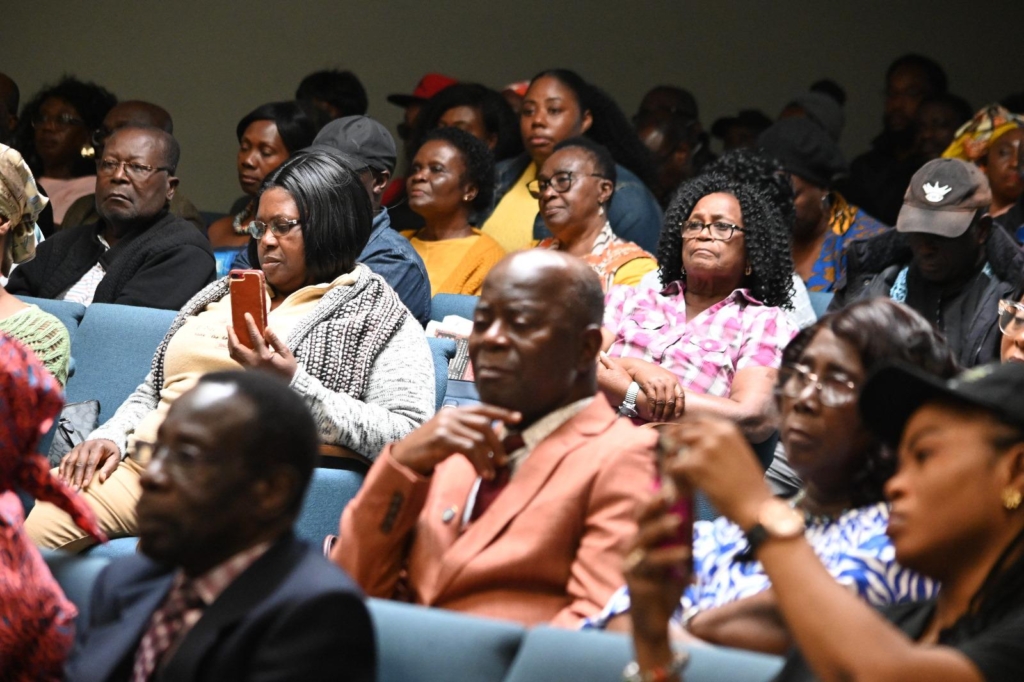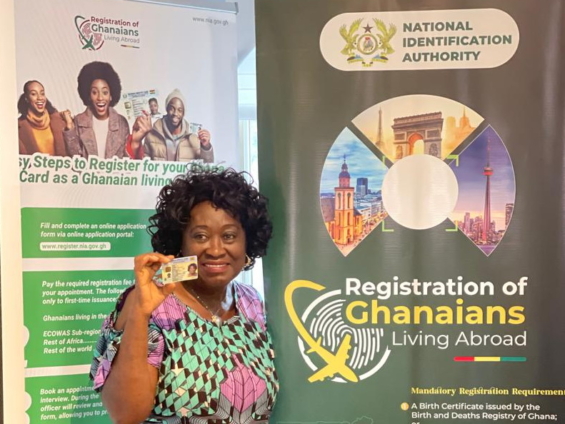In a major step to extend Ghana Card services to Ghanaians living outside the country, the National Identification Authority (NIA) has begun issuing cards to Ghanaians in Ottawa and Ontario in Canada under the first phase of the pilot exercise.
Pilot phase locations
The pilot phase has commenced in Ottawa and Ontario in Canada and will be extended to Washington, D.C., and New York in the United States of America.
Last week, officials from the NIA and its technical partner, Identity Management Systems (IMS), held public engagements in Ottawa and Ontario after which they trained selected officials of Ghana’s mission in Canada.
These staff are working as registration officers in the first phase of the pilot exercise to register Ghanaians abroad.

Officials from the NIA and IMS, are currently in New York to hold public engagements and train embassy staff to serve as registration officers.
Simplified registration
Ghanaians abroad are able to fill out forms online and pay the required fees to book appointments from the comfort of their homes.
Applicants and persons vouching for them are interviewed online.
Applicants only go to the mission at their appointed date and time to donate their biometrics and be issued their cards.
This process is projected to take only 10 minutes making the process more flexible.

Fees for registration
Fees approved by parliament for the registration vary by region, with ECOWAS nationals paying $55, the rest of Africa $75, and the rest of the world $115.
The foreign registration covers individuals aged six and above.
Valid passports and birth certificates are required, but applicants without these documents can be vouched for during the interview process. However, those who have renounced Ghanaian citizenship or are non-Ghanaian spouses cannot register.
Dual citizens who can prove their Ghanaian heritage are eligible to acquire the Ghana card.
NIA’s global initiative
NIA Board Chairman Mr. Abel Edusei described the engagement as a major milestone in the NIA’s work to identify Ghanaians around the world.
He noted that the engagement in Ottawa is historic and a significant step in the NIA's effort to extend the Ghana Card beyond the borders of Ghana.

Training for mission staff
NIA Executive Secretary Prof. Kenneth Agyemang Attafuah announced plans to train the staff of Ghana’s missions to handle registrations, explaining that NIA is legally mandated to train these officials as registration officers.
Prof. Attafuah also took participants through the NIA’s mandate, its achievements, and the integration of the Ghana Card into the ECOWAS system to avoid the need for a separate ECOWAS identity card.
Security features of the Ghana Card
Prof. Attafuah highlighted the security features of the National Identification System (NIS) and clarified that first-time registration for the Ghana Card is free at NIA district and regional offices in Ghana.
However, he said registration at premium centres and for institutions or groups attracts a fee.
Additionally, he stated that cardholders would need to pay for a new card when their existing one expires after 10 years.
Prof. Attafuah explained to the gathering that the Ghana Card’s Personal Identification Number (PIN) serves as a replacement for various identification numbers, including the Social Security and National Insurance Trust (SSNIT) number, Tax Identification Number (TIN), and National Health Insurance Scheme (NHIS) number.

Data security assurance
Responding to questions, Executive Director of IMS, Mr. Emmanuel Selby assured participants that all data is stored in Ghana and not in the cloud.
He explained that private virtual networks are used from the registration centres and NIA’s site.
According to him, the primary site is located at NIA’s Head Office in Accra, with a secondary disaster recovery site in Kumasi.
He said real-time synchronisation occurs between the two sites.
Mr. Selby also noted that only specific subsets of data are shared with institutions, as mandated by law, and biometric data is not shared with user agencies.
Mr. James Cantamantu-Koomson, Chief Operating Officer of IMS, explained that biometric verification is done for every transaction to prevent identity theft, as relying on visual inspection of cards poses risks.
Community engagement in Ottawa
Ghana’s Ambassador to Canada, Anselm Ransford Adjetey Sowah, organized the interaction in Ottawa.
Participants expressed their gratitude for the education about the Ghana Card registration process, describing it as very useful.
Latest Stories
-
Ex NYC Governor Andrew Cuomo under investigation for Covid testimony
3 hours -
OKESS firearm case: Student, stepfather granted GH¢80,000 bail
3 hours -
Ghana throws open its doors with visa processing slashed to 5 days in dramatic policy reset
3 hours -
Italy tightens rules for Italian descendants to become citizens
3 hours -
Trump ambushes S African leader with claim of Afrikaners being ‘persecuted’
4 hours -
Judge says US deportations to South Sudan violate court order
4 hours -
US accepts gifted Qatari plane to join Air Force One fleet
4 hours -
Tottenham beat Man Utd to win Europa League & end 17-year wait for trophy
4 hours -
Clear and strong climate policies are antidote to economic uncertainty – UN Climate Chief
4 hours -
Journalism has become politicised and cheap – KSM laments
5 hours -
Climate Education reaches differently-abled children at Garden City Special School
5 hours -
Mahama’s remarks on Cedi vindicate NPP’s economic legacy – Minority
5 hours -
I lied about having radio experience to get hired – KSM
5 hours -
NLC direct University Senior Staff Association to call off strike
5 hours -
Shelters in crisis: Calls grow for gov’t support as caregivers struggle to protect vulnerable children
5 hours

